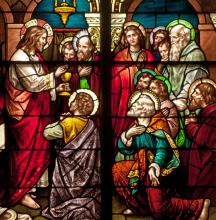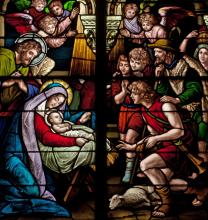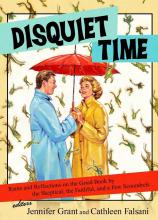Bible Study

There are many reasons for divorces and one of them is domestic violence. It’s true that there are women and men who experience domestic violence and never leave the marriage; they only want to cleave while others leave for their dear life. Domestic violence can be viewed as family violence but there are family members from whom we may rarely hear in these situations, namely children. Most certainly, domestic violence impacts the perpetrator and victim yet if there are children in the same space, they, too, will be affected. They, too, may even be beaten, battered, and bruised. This is the blues-inflected struggle of life.
The book of Mark focuses a lot on the suffering of Jesus. Pain seems to have some privilege in the way Mark preaches the gospel. He keeps it real. Mark is a truth-teller because even today many travel a trail of tears. The level of pain and the type of pain vary. But the honest truth is that life is not a bouquet of sweet-smelling roses. There are thorns and fractures. There is brokenness — broken bodies and relationships — so it is of no surprise per se when we see Jesus and the Pharisees engage in a conversation about marriage and divorce, topics that may heighten our awareness of human brokenness in our society. It’s no secret that many marriages fail and end in divorce, whether they are people of faith or not.

I practiced family law in California for many years. I know the anguish of the breakup of a marriage. Often one spouse would come to me to try to untangle the legal mess of a marital relationship. What I noticed was how much ambivalence went into the process. So many wished that they could salvage the marriage but for a myriad of reasons it was not possible. Sometimes there were situations of domestic violence, impossible economic pressures and a host of other impossible hurdles. And more often than not, my clients felt judged and ostracized from their church and circle of friends. It was a lonely road to try to find a way beyond the harsh judgments.
The Mark 10 text is a challenging gospel in our society that has a high divorce rate. But I have a hunch that there is a deeper truth that Jesus was trying to get at. First the Pharisees were trying to trap Jesus so Jesus responds by tweaking the Pharisees. The Pharisees were playing a game of “gotcha” where they could claim the high ground and discredit this revered teacher. Jesus says in that context that marriage is about love and unity, commitment and engagement. The Pharisees want Jesus to draw the clear bright line that all can easily judge. But life is not so simple.

During his visit to Bolivia in July, the pope addressed an audience of farmers, trash-pickers, craftspeople, and un-unionized workers. He expressed his compassion for the poor and the marginalized and advocated passionately for them, but he did not stop there. As he did in his encyclical on climate change, the pope identified and condemned the systemic and structural causes of their suffering: the global idolization of capital and the pursuit of wealth.
The book of Esther also reflects on a political and cultural system that venerates status and wealth, sets people against one another, and thwarts human flourishing. Even if the book does not explicitly call for change, the story’s ironic reversals, which result in increasingly absurd levels of violence and destruction, reveal just how vulnerable every person in the empire is, including those with the ability to influence the king.
Set in the Persian court in Susa (the capital of the ancient Persian Empire), the book of Esther reads like farce, brimming with political intrigue, sexual innuendo, and murderous plotting. However, for all its comic revelry, the book of Esther is concerned with the serious business of survival in a system driven by vanity, gluttony, and greed.

THE LECTIONARY PASSAGES for these weeks of Pentecost make the season come alive. Why? Because who doesn’t light up at receiving gifts? We humans are pretty good at giving gifts—Christmas, birthdays, graduations. Yet our giving pales in comparison to that of the Holy Spirit. Usually we give because we expect something in return. The Holy Spirit gives freely and abundantly out of unending love and grace. These scriptures tell of the Holy Spirit giving us all we will need to lead God’s people: happiness, tongues, humility, and boldness. And yet we’ll also get more than we need: The Holy Spirit both gives and empowers.
For the work ahead, we will certainly need a power that goes beyond ourselves—unless we are satisfied with half-baked sermons, timid leadership, and time-bound visions. In case this sounds like your grandmother’s preacher on the “fruits of the spirit,” remember that the Spirit put on display in these verses is the prophetic, justice-loving, reconciliation-seeking third person of the Trinity who anointed Jesus with his mission. His was a mission “to bring good news to the poor ... to proclaim release to the captives and recovery of sight to the blind, to let the oppressed go free, to proclaim the year of the Lord’s favor” (Luke 4:18b-19). What a politically theological imagination, capable of transforming the world! It’s the same one the Holy Spirit gives to us today through the church for the world. That’s a gift worth dying for. Holy Spirit come, come quickly!

IN THE LECTIONARY PASSAGES for these weeks following Pentecost, we find God working in and through the ordinary: a shepherd boy, bread, dancing. In each passage God breaks through with incredible revelation; some promise, some challenge, some person unexpected. Not everyone in the passages notices. Paying attention is crucial. We’ll have to be open to being caught off guard, being surprised. The Holy Spirit gives us eyes to see. As we engage in leadership and ministry these weeks, what we are sure to find is Jesus showing up in all the places we might not expect, when we’re washing dishes, driving in the car, eating a meal. And we certainly don’t expect him in the faces of the white poor, in the lives of racially profiled black youth, or in the stories of the undocumented.
We bring into worship our vestments, our commentaries, our manuscripts. God speaks through these—no surprise there. But God grips us in these unexpected places. These are what we should carry with us into worship every Sunday. But we will need more than eyes to make them preach; we’ll need power. The Holy Spirit gives that too. It makes the heart come alive. The gospel artist Fred Hammond said it best: “When the Spirit of the Lord comes upon my heart, I will dance like David danced!” Dancing and singing shape the heart of God’s new community, for joy, for freedom, for hope. May we be open to the Spirit’s vision and boldness!

THE MORE I READ the story of Jonah nestled among the serious Minor Prophets of the Old Testament, the more fantastic and hilarious it gets. Everything is turned upside-down.
Jonah’s story follows Amos, who rips into rich people who “lie on beds of ivory and lounge on their couches.” It precedes Micah, whose Lord calls us “to do justice and to love kindness.” But Jonah spends his energy running away from Yahweh. In fact, Jonah is never even called a prophet in the book that bears his name. His interests and concerns are completely different from the Deity who has called him. Only entombment inside a “great fish” will drive his bedraggled, stinking self to the city that needs to repent. Even so, Jonah will perceive his surprising success as an utter failure.
But that’s getting ahead of the story. Most Hebrew prophetic books are collections of oracles unmoored to narrative, but Jonah’s tale has a setting, characters, and a plot! If you didn’t learn this in children’s Sunday school, here are the bare bones of the action:
Yahweh tells a man named Jonah to go east to the city of Nineveh to cry out against its evil. But Jonah flees in the opposite direction on a ship traveling west. A huge storm blows in, so when Jonah says it’s his fault, the sailors reluctantly throw him overboard. The storm immediately stops. A “great fish” swallows Jonah for three days and nights. Then God makes the fish vomit Jonah out on dry land.
In part two, Yahweh repeats his original imperative: Go to Nineveh and warn them of destruction. Jonah does so, expecting a fireball from heaven to burn the city to the ground. Instead, the king repents of his evil and asks all his subjects, as well as the animals, to demonstrate repentance by wearing sackcloth. So God changes God’s mind and does not destroy Nineveh. Jonah is angry because the Ninevites do not get what they deserve. He sulks under a bush God creates for him. The ensuing conversation underlines Jonah’s resistance to the merciful and loving character of Yahweh. The ending is ambiguous.
THE GOSPELS OF Mark and Matthew both include the story of a Gentile woman who begs a reluctant Jesus to heal her daughter (Mark 7:24-30 and Matthew 15:21-28).
I thought of these texts last fall while reading I Know Why the Caged Bird Sings, an autobiographical work of the acclaimed poet Maya Angelou, who died last year. Born in 1928, Angelou spent most of her childhood with her grandmother in small-town Stamps, Ark. After a few years of eating candy from her grandmother’s grocery store, Maya developed two cavities that, she writes, “were rotten to the gums.” However, the white dentist in Stamps did not take “Negro” patients, and the closest black dentist was 25 miles away.
For several days no aspirin touched the blinding pain, so her grandmother finally took her to the white dentist, determined to beg and plead for help. Her grandmother recounts the dentist’s final rejection in highly colorful language: “Said he’d rather put his hand in a dog’s mouth. … He said, ‘Annie, I done tole you, I ain’t gonna mess around in no niggah’s mouth.’”
We may recoil at such naked racism, but in the segregated Jim Crow South, this sentiment must have been typical. I can imagine white churchgoers reacting to this story by thinking, “The nerve of that woman begging help from a white dentist! She got what she deserved.”

Contemporary History
The duo Ibeyi are Naomi and Lisa-Kaindé Díaz, 19-year-old French-Cuban twins with Yoruba roots—a West African culture transplanted to Cuba during slavery. Ibeyi’s self-titled album begins and ends in prayer; in between is a fusion of English and Yoruba, minimalist piano and percussion, jazz and hip hop. XL Recordings

THE SEASON AFTER Pentecost is a challenge. Some churches call it “ordinary time.” This is where most of our life is lived, spiritually speaking. The fact that other churches call it “the season after Pentecost” reminds us that a miraculous tongue of fire is needed for any sermon to work—and the Holy Spirit has a tongue of fire for us. Pentecost propels us through ordinary time. The Holy Spirit can take as sorry a lot of losers as the ones Jesus chose as disciples and turn them into apostles, martyrs, world-changers. God has always done more with less-promising material.
A retreat at a monastery gave me a glimpse of what ordinary time means. By the time 8 a.m. Mass rolls around, we’ve already been in church three times that day. Mass is beautiful, we leave buoyantly, the Trappist monks are nearly chatty. Then the bell rings. It’s time for Terce, another hour of prayer. That bell sets me to sighing—weren’t we just in church? Terce is like the Sunday after Easter or Christmas—a letdown. Same building, half full of people, and with a quarter of the energy. And it is precisely then that it’s important to worship God. The church’s worship of God carries on when we’ve all gotten bored or tired. Such worship is good for souls. Preachers’ souls included.

BY THIS TIME in the church calendar, the liturgical highlights feel like they’ve slowed considerably. The excitement of Easter is gone, not to be replaced by another holy season until Advent. Pastors and parishioners, who all stayed away the week after Easter, hopefully have returned. The holy days seem to have drained away into the season of counting the weeks, depressingly named as “ordinary time.”
Ecclesially speaking, however, the holy days are amping up considerably at this point. Easter season hits a crescendo with these latter weeks. The ascension of Christ used to be marked as one of the greatest feast days of the year, up there with Easter, Christmas, and Pentecost. It signifies Christ’s rule over all things, hidden now, to be full-blown and publicly obvious to all in God’s good time. Christ himself insists that he must go away in order that the Advocate would come and, in John’s language, to enable us to do even “greater works” than Jesus ever did. Pentecost is a new outpouring of the triune God to empower the church to do those greater works. There is much here to be celebrated. A crescendo, not a tapering off.
These texts present a reign inaugurated with resurrection in which the poor eat and are satisfied. One built on friendship and common love. It suggests a God who likes getting born enough that God decided to go through the experience and told the rest of us we should go through it all over again. Is that bodily enough for you?

DURING THE EASTER SEASON, the first reading in our lectionary becomes, strangely, a New Testament reading. Most of the year, we immerse ourselves in the scripture we share with the Jews, but after the resurrection we traipse through the book of Acts. The claim being made is that the history of God’s chosen people continues in the history of the church. God is still working signs and wonders. And these include the sharing of goods in common, the fact that there are no needy people among us, bringing awe and distress among our neighbors, and a dawning kingdom brought slightly closer. Just like in our churches and communities today, right?
These Easter texts are also deeply sensual and material. God’s reign is imagined as a banquet with rich wines and marrow-filled meats. Love between sisters and brothers is like oil running down the head, over the face. The resurrection texts themselves insist on this point more emphatically than any other: Jesus is raised in his body. This is the beginning of God’s resurrecting power breaking out all over the creation God loves. What could ever be impossible after a resurrection? Our limited imaginations of the possible (Can we make budget? Can we get a few more votes on this bill? Can we improve lives in this neighborhood?) are shown for the bankruptcy in which they are mired. A new order is here. We pray, God, make our imaginations match the sensuousness, the materiality, the grandeur of what you have already accomplished and, more daringly still, what you promise yet to do.

ONE OF THE UNANTICIPATED effects of our health-care technologies is that we expect to live relatively pain-free lives, physically speaking. In the West, we do not imagine a physician saying to us “this will hurt” before cutting in. We expect to be anesthetized to avoid pain. In the same way we struggle with a biblical pathway to God, like Lent.
In Lent, we put ourselves on a lonely road with Jesus—40 days in the wilderness, struggling with hunger, thirst, loneliness, doubt, fear. In Lent, we put ourselves in a 40-year journey in the wilderness with the people Israel, wondering when, if ever, God will make good on the promises of a land flowing with milk and honey. In Lent, we do business with repentance.
Whatever else the church may say about repentance, we certainly say, “This will hurt. And not just a little.” Repentance means “turning around.” It also means dying, biblically speaking. We are drowned in baptism and raised to new life; we go to extremes in the wild until an entire generation dies off (the exodus) and until we are reduced to one searing set of emotions (the crucifixion). Jesus’ cross wasn’t light. Why should we expect ours to be?
Then there’s the good news. A resurrection is on the far side of that cross. Its blinding light pours around the edges of the stone rolled before the tomb. Resurrection is not in Lent, but it’s coming. In the meantime, in the words of John the Baptist, “Prepare the way.”

THE LAST SUNDAY IN FEBRUARY is the first Sunday of Lent. We are asked to prepare for Lent by searching our souls and repenting of our misdeeds in order to walk with Jesus on his road to the cross. After writing the final reflections below, I felt unfinished. Repentance is easy to talk about but exceedingly hard to do. We justify and excuse our actions when we’ve hurt a friend or made a bad choice. It’s usually someone else’s fault anyhow—they started it!
The most striking example of human resistance to repentance I’ve ever read was in C.S. Lewis’ little book The Great Divorce. The “divorce” is the huge gap between heaven and hell. Hell is not fiery but filled with people who can’t get along with each other and keep moving further apart in the darkness. Eventually, a few make their way to a bus stop where they get a ride to the outskirts of heaven. There everyone is met by someone from their past they’d rather not meet, and who begs them to repent, make restitution, or whatever is necessary to enjoy a joyful eternity of loving relationships. For almost all of them, it’s not worth it. They fear losing the bit of ego they have left. They’d rather go back to hell than repent and be reconciled with someone they love to hate.
No wonder repenting is the first step to entering the kingdom of God!

IF WE FOLLOWED the church calendar and celebrated Epiphany in January, we wouldn’t have to cram the wise men into the crèche to compete with the shepherds. We could save all the “Star of Bethlehem” songs to brighten the cold days of January. Obviously, the magi needed a few weeks to prepare and then travel “from the East.”
A new bright object in the sky was certainly an “epiphany,” but it was not totally unexpected. These magi were astrologers, the ancient astronomers of their day. To the east of Jerusalem lay Babylon, birthplace of astrology and location of a large Jewish community. The discovery of two astrological books among the Dead Sea scrolls showed that the sign of Aries the Ram in the zodiac represented the reign of Herod the Great in Judea. Since Herod was aging, it is not surprising that Jewish astrologers were watching this royal constellation.
In a television series called Jesus: The Complete Story, astronomer Michael R. Molnar notes an unusual astrological conjunction on the night of April 17, in 6 B.C.E., the year Jesus was most likely born. At that time, both Saturn and the sun were in the constellation Aries, and then the moon eclipsed to reveal Jupiter, king of the planets, also in Aries. Jupiter shone into the dawn, another auspicious sign of royalty. It was confirmation enough to send these astrologers on their way.
Perhaps if we celebrated Epiphany after Christmas, we’d have more time to learn about this epiphany and its remarkable interpretation.

I CONFESS THAT I do not often use the Revised Common Lectionary. As a Bible professor, I prefer to read texts in their larger literary and historical contexts. When a brief reading from one time period is lifted out of its context and juxtaposed with another written many centuries later, it can feel like an invisible hand is forcing me to compare apples and oranges—or even apples and mushrooms.
Nevertheless, I have been enriched by this year’s readings for Advent and Christmas. My “larger historical context” has become the sweep of a thousand years of Israelite history, from King David to the birth of the “son of David.”
For Christians, the coming of Jesus was a singularity. Though we focus on his birth in this season, that lower-class event was barely noticed at the time, and it is not mentioned by two of our gospel writers. It is his entire life, ministry, death, and resurrection that echoes throughout the ages and ushers in our hope of salvation. Our prophets and psalmists from the Hebrew Bible could not foresee details of the Christ-event from their perspectives centuries earlier. Yet their intuitions and hints and poetic expressions of joy over God’s in-breaking from their times are now borrowed to give voice to our exultation over Jesus’ coming today.
In a culture measured by quarterly profits and immediate gratification by credit card, we need a longer view to better understand what God is doing throughout human history. These Advent readings call us beyond the present to the millennia of the past and the hope of the future stretching to eternity.

It was in my senior year of high school that I began to lose my faith in Scripture.
Then, my first year of college I read the entire Bible, cover to cover, and that pretty much destroyed what confidence I had left.
The Bible, I discovered, was full of polygamy, incest, murder, rape, genocide, adulterers, inconsistencies, impossibilities, and a whole bunch of screwed-up people who never seemed to get anything right.
The more I studied the “perfect” word of God, the more I expected that doctrine would become clear and consistent, the authors exemplary, and the stories contain distinct and readily discernible meanings.
When I read, I found I had more questions than answers, concerns than affirmations, and was more likely to feel disrupted than tranquil.
I almost gave up entirely.

WE LIVE IN A TIME of widespread violence. No country, no community, no person is untouched by violence. It is a complex problem stemming from our thought patterns and actions that are, in turn, shaped by various forces in our daily lives. Because violence is so complex, we often seek an easy answer—typically, naming a specific religion, culture, ethnicity, or nationality as a cause of the evil that perpetrates or stimulates violence.
But we all know that such scapegoating is another crime that only creates more violence. Each and every individual and community has good and bad, strength and weakness, merit and demerit. Just as no one is perfectly good, no one is perfectly evil. In her well-known book Eichmann in Jerusalem, philosopher and writer Hannah Arendt points out that evil is related to the lack of reflective thinking. “The longer one listened to [Eichmann],” writes Arendt, “the more obvious it became that his inability to speak was closely connected with an inability to think, namely, to think from the standpoint of someone else. No communication was possible with him, not because he lied but because he was surrounded by the most reliable of all safeguards against the words and presence of others, and hence against reality as such.”
For Arendt, to think reflectively means to be aware and to take into account the reality that one’s own life is always in relation to the lives of others. This is also what the biblical texts this month invite us to contemplate.

THE PROBLEM WITH Christianity today is not that Christians lack faith in God. The problem is that Christians believe they “know” and “understand” God completely. In a world overflowing with information, we hardly acknowledge the importance of God’s unknowability. Yet a conception of God that doesn’t recognize the unknowable keeps us in an uncritical banality, which in turn leads us to follow orders without questioning, to play it safe, and to go along with mass opinion.
For Christians, conversion is required. Theologian Bernard J. F. Lonergan defines conversion not simply as an acceptance of a new belief system, but rather as “a radical shift from an old horizon to a new horizon.” Religious conversion, in particular, is to “fall in love with God.” Thus, to convert is to deny the conventional, habitual belief and knowledge system, and to discover a new reality in which one becomes open and vulnerable to challenges. Conversion is not a solitary experience. It is a prolonged dialogue that constantly transforms one’s horizon and motivates us to wonder, appreciate, and raise more questions.
The texts for the next four weeks invite us to a conversion experience. They are reminders that conversion starts with abandoning any sense of security based on doctrines, dogmas, rituals, and systems of belief—precisely because God’s love never allows us to find comfort in human constructions.

"Living the Word" reflections for October 2014 can be found here.
ACROSS DENOMINATIONS, Christians have attempted to build a more egalitarian and democratic ecclesiastical structure. The phrase “discipleship of equals,” coined by the feminist theologian Elisabeth S. Fiorenza, suggests that a community of Jesus’ followers cannot tolerate an absolute, centralizing power that justifies a relationship of dominance and subordination.
Yet, while Christians continue to challenge hierarchical structures in the church, we also acknowledge that a discipleship of equals will not be established simply by removing the hierarchy. The church is enmeshed in a concrete reality of everyday life, filled with a web of power relations that are neither fixed nor necessarily top-down.
Power relations experienced within the church are often inconspicuous. They take the form of microaggressions, subtle insults against other members because of gender, sexual orientation, race, class, and ability status. What is even more hurtful is that these insults are often disguised as “caring,” as when someone perverts a prayer request into gossip. The experience of the powers in the church can be paradoxical. Christians must deal with complicated and variegated claims to power, all of which borrow the name of God.
The texts for the next four weeks highlight the struggles in forming a community of God. They raise the question of power relations within the faithful community: How do we use the word “power” and what should be our first instinct in situations of conflict?

AS A NATIVE KOREAN who has studied and taught in the U.S. for more than 13 years, I feel like I’m always swinging between two lands—neither giving me a sense of home. Nostalgia might be too gentle a word to describe this in-between space. Rather, it’s a bitter and unpleasant reality constantly reminding me that to some I appear “strange,” “irregular,” “awkward,” “unskillful,” or “suspicious.” In this situation, I remain “unnatural.”
I often feel the same way in the church. My ethnicity and gender are considered marks of “otherness”—even in my own denomination. Every waking moment I wrestle with this question: How can I incorporate my body, my culture, my language as a Korean woman theologian fully into the body of Christ? This wrestling, while uncomfortable, also prevents me from settling with easy or convenient answers. Perpetual dislocation leads me to pay attention to the unseen and unheard corners of the world. It demands I examine old convictions and construct a creative space for new ways of thinking about God, life, and the nature of justice and hope.
The majority of our biblical stories come from people who were also living outside their own land. They too were in some way dislocated. The biblical texts this month call particular attention to their emotions, tensions, and challenges. They invite all of us to feel lost with them, to tremble with them, and to be courageous with them.